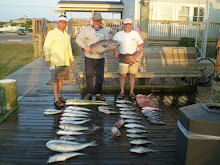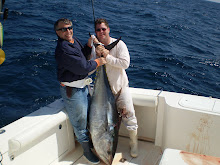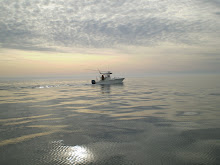
At least some fishermen are having a good year--lobster fishermen, it turns out. Well, by my compass, they deserve it, seeing how the Maine lobster fishery is perhaps the only self-policing fishery on the face of the earth. Meaning the lobstermen themselves enforce harvesting limits and will take (often violent) action against those who break the rules--and thereby pose a danger to the economic stability of the larger community. As explained in the NYTimes article below, this past season weather helped a lot as well. So the Fishing Gods, in summary, were good to them. I'm sure these folks also know that good fortune one year often means these same Gods will be predisposed to screw them the next. Moral of the story: enjoy the good times, but don't forget the bad; i.e., leave a few bucks in the bank account.
Ron Francoeur of Kennebunkport, Me., hauled his traps from the ocean on Thursday for the last time until April.

February 26, 2011
After a Record Haul in Maine, Try the Lobster Mac and Cheese
KENNEBUNKPORT, Me. — The dozens of traps that Ron Francoeur pulled from frigid waters here on Thursday held only about 30 lobsters, but maybe it did not matter. Last year’s statewide lobster haul — 93 million pounds, up from 81 million in 2009 — was the largest on record. And Mr. Francoeur allowed that he had shared in the bounty.
“I had a very good year,” he said.
Mr. Francoeur, who has been fishing since the 1980s, would not elaborate; lobstermen are famously secretive about where they fish and what price they get for their catch. But the numbers that the Maine Department of Marine Resources released this month suggested that Mr. Francoeur’s traps and untold others saw extraordinary action last year.
Unusually warm water played a role, said Carl Wilson, the state’s chief lobster biologist. Lobsters molted earlier in the year, which meant that many were big enough to legally catch by early July, a month sooner than usual.
“The planets were aligned for an early molt and really good fishing through the summer and fall,” Mr. Wilson said.
The other, more significant factor — a lobster population boom that has been building for at least 15 years — is harder to explain, he said. The decline of predators, like cod, and the state’s strict conservation rules for lobster are among the most commonly cited reasons.
“For every one that comes to market,” said Dane Somers, executive director of the Maine Lobster Council, “about three go back into the water for conservation. Can you even get your mind around how many we’re talking about?”
Despite the vast supply, prices went up too, a promising turn of events after the global financial crisis forced drastic price declines in 2009. Lobster sold off the boat for as little as $2 a pound that summer, forcing many fishermen, including Mr. Francoeur, out of the business temporarily. Last year, the average price rose to $3.31 a pound, according to the state.
That was well below the high of $4.63 a pound in 2006, but it was enough to keep men like Mr. Francoeur, who had to supplement his income with a trucking job in 2009, on the water.
The 2009 crisis might have had a silver lining, Mr. Somers said. The low prices brought new markets — chain restaurants like Ruby Tuesday and Panera added lobster to their menus — and forced innovation. The lobster council is heavily promoting lobster in China, where, to the vexation of some here, they call it Boston lobster, Mr. Somers said. And a handful of new companies are producing packaged lobster convenience foods, like lobster macaroni and cheese, with the goal of selling them in grocery stores nationwide.
One such company is Calendar Islands Maine Lobsters in Portland, which will introduce its lobster mac and cheese and lobster pizza at the International Boston Seafood Show next month.
“We’re trying to put lobster into markets where it hasn’t been,” said John Jordan, the company president, “in forms where people can just buy it and put it in the oven and have an easy meal.”
Not all of the 4,260 commercial lobstermen estimated to have actively fished in Maine last year caught record amounts. Jason Joyce, an eighth-generation fisherman on Swans Island, described his catch as mediocre, even though Hancock County, where he lives, had the state’s largest haul, 31 million pounds.
“It’s very area specific,” Mr. Joyce said. “You could be within half a mile of someone who is doing three times as good as you are.”
Mr. Francoeur would not reveal where he planted his 800 traps last year but said the farther out people fished, the better they did. Thursday was his last day on the water until April.
In the meantime, he said, he will hit the ski slopes and repair his gear. He is not assuming that his luck will extend through 2011, not least because gas prices are rising again. “You never know,” he said. “It could be the worst we’ve had in years.”









No comments:
Post a Comment